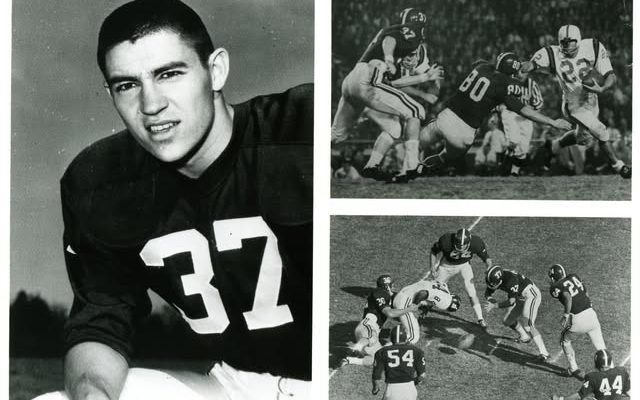From Quarterback to Legendary Safety: How Bobby Johns Helped Lead Alabama to a National Title and Became One of the Crimson Tide’s Most Impactful Players
In the storied history of Alabama football, legends are made not only through talent but through grit, adaptability, and an unwavering commitment to the team. Few embody those qualities more than Bobby Johns, a name etched into Crimson Tide lore for his vital role in one of the program’s most defining eras. Though he began his collegiate journey as a quarterback, Johns transitioned to the defensive side of the ball, ultimately becoming one of the most impactful safeties in Alabama history. His journey from offensive hopeful to defensive cornerstone played a pivotal role in Alabama’s 1965 national championship and left a legacy that endures to this day.
Bobby Johns arrived at the University of Alabama in the early 1960s during a golden era under legendary head coach Paul “Bear” Bryant. At the time, the Crimson Tide were already cementing their reputation as a national powerhouse, having won national titles in 1961 and 1964. Johns, a standout high school quarterback from Lakeland, Florida, was recruited as a signal-caller, and by all accounts, had the leadership qualities and athleticism to succeed at the position. However, destiny had other plans.
Like many great programs, Alabama thrived on adaptability. The coaching staff quickly saw that while Johns had a strong football IQ and instinctive playmaking ability, his true potential might be better served in a different capacity. In an era where versatility was valued and roster depth was a strategic weapon, the decision was made to move Johns to the defensive backfield—a move that would redefine his career and solidify his place in college football history.
Adjusting from quarterback to safety required more than a position change—it required a mindset transformation. As a quarterback, Johns was accustomed to orchestrating plays and reading defenses. Now, he had to anticipate and dismantle offenses, interpret formations from a defensive perspective, and become the last line of defense in Alabama’s secondary. Fortunately, his time under center gave him a unique edge. He understood the quarterback’s mindset, allowing him to read opposing passers with uncanny precision. That football intelligence, combined with his quickness and fearlessness, quickly turned him into a force on the field.
By 1965, Bobby Johns had emerged not just as a starter but as a leader on the Crimson Tide’s defense. That season, Alabama was seeking redemption. Despite finishing the previous year undefeated in the regular season, the team had been denied a national title by the polls. In 1965, they were on a mission. Led by the dynamic duo of quarterback Steve Sloan and wide receiver Ray Perkins on offense, and anchored by a suffocating defense featuring Johns, the Tide set out to reclaim their place atop college football.
Johns was instrumental in solidifying the secondary, providing not only physical play but cerebral leadership on the back end of the defense. His ability to cover ground, deliver punishing tackles, and come up with timely interceptions helped Alabama dominate opponents and control momentum in key moments. He was a natural communicator, often barking out adjustments, shifting coverage, and ensuring his teammates were aligned correctly. His experience as a quarterback made him a coach on the field—something Bear Bryant deeply valued.
One of the most iconic moments of Bobby Johns’ career came during the 1966 Orange Bowl, which served as the final game of the 1965 season. Alabama faced off against the Nebraska Cornhuskers, a high-powered team with national aspirations of their own. The stakes were clear: with a win and a few favorable outcomes in other bowl games, Alabama could secure another national championship.
The Crimson Tide rose to the occasion, and Johns played a critical role in stifling Nebraska’s offense. Time and again, he flew across the field, breaking up passes, making open-field tackles, and eliminating any hope Nebraska had of establishing rhythm. His performance was part of a broader defensive effort that held the Cornhuskers to just 28 points, while Alabama’s offense erupted for 39. When the dust settled, Alabama had made a compelling case for the national title, and the Associated Press ultimately crowned the Crimson Tide as national champions in their final poll.
For his contributions throughout the 1965 season, Bobby Johns earned All-American honors, a testament to his excellence and importance to Alabama’s success. But beyond the accolades, what truly set him apart was his leadership and humility. He never sought the spotlight, instead embracing his role as a team-first player willing to do whatever it took to help Alabama win. That unselfishness resonated with both teammates and coaches, and it helped define the culture of excellence that has persisted within the Alabama program for generations.
After his playing days, Johns didn’t walk away from football. He remained deeply connected to the game, coaching at both the college and high school levels. His commitment to developing young athletes and teaching the game’s finer points mirrored the mentorship he once received under Bear Bryant. Johns’ post-playing career was marked by the same integrity and passion he displayed on the field, earning him respect well beyond Tuscaloosa.
The impact Bobby Johns had on Alabama football transcends statistics and awards. He represents a time when character, adaptability, and dedication were just as valuable as raw talent. His story serves as a reminder that greatness often comes from unexpected paths. Though he arrived at Alabama dreaming of quarterback stardom, his willingness to change positions and fully embrace a new role helped deliver a national title and elevated him to legendary status within the Crimson Tide community.
Even decades later, Johns’ influence can be felt within the program. His journey is often cited as an example for players facing position changes or adversity. Coaches point to his story to illustrate the importance of trusting the process, embracing team needs, and understanding that personal sacrifice can lead to team glory. In a world that often celebrates flash and individualism, Bobby Johns’ legacy stands as a testament to discipline, toughness, and selflessness.
In the pantheon of Alabama football greats, names like Joe Namath, Derrick Thomas, and Mark Ingram might dominate national headlines, but within the halls of Bryant-Denny Stadium, Bobby Johns’ legacy resonates with equal reverence. His name may not appear in every highlight reel or Heisman discussion, but his fingerprints are all over one of the most critical championship runs in Alabama history.
What makes Bobby Johns truly legendary isn’t just what he did on the field—it’s how he did it. His transformation from quarterback to elite safety was marked by humility and resolve. His contributions to the 1965 national title run were a result of tireless effort and deep understanding of the game. And his lasting influence comes from the way he carried himself, as a leader, mentor, and embodiment of Crimson Tide values.
For Alabama fans, Johns represents everything that’s right about college football. He was tough without arrogance, smart without ego, and effective without flash. As new generations of players don the crimson and white, they follow in the footsteps of men like Bobby Johns, whose legacy continues to inspire and guide the program. His story is not just about football—it’s about transformation, resilience, and the quiet power of doing the right thing for the team.
In remembering Bobby Johns, Alabama doesn’t just remember a great player—it remembers a cornerstone of its dynasty, a leader of men, and a true Crimson Tide legend.



